| Srl | Item |
| 1 |
ID:
140460
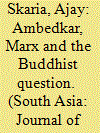

|
|
|
|
|
| Summary/Abstract |
This essay tries to frame one question, which at its most abbreviated can be posed thus: why does Ambedkar convert to Buddhism? Given Ambedkar's militant secularism, to ask this question is also to ask: what assumption of responsibility does that conversion enable which exceeds secular responsibility? This essay tracks how Ambedkar's religion questions both the liberal concept of minority, and the dissolution of the minor that is staged in Marx's critique simultaneously of religion and secularism. Buddhism becomes in the process a religion of the minor.
|
|
|
|
|
|
|
|
|
|
|
|
|
|
|
|
| 2 |
ID:
165238


|
|
|
|
|
| Summary/Abstract |
Through bringing history into conversation with ethnography, this paper re-examines scholarly understandings of Hindu nationalism and the practice of seva (service). Whereas much scholarship addresses Hindu nationalist service through a secular-liberal register, this paper considers what this language excludes. Giving critical attention to elite activists within the Hindu nationalist-led Vanavasi Kalyan Kendra (Tribal Welfare Centre), in Jharkhand, India, my research demonstrates how elite activists translate service into a religious language of somatic representation. This constructs marginal agents as passive subjects of a heavily moralistic ethical-self making project. This critical analysis opens up for study the differing ritual-politics of caste and gender which underlie the participation of marginal actors, practices which are not reducible to a discourse of religion or a universal category of acts. In order to grasp these more complex models, this paper gives importance to the ways in which its ethical discourses are inhabited in manifold ways. This tells a story of how Western models of religion are parochialized, and challenges the relationship between authority and agency which permeate our imagination of non-liberal discourses like those invoked by Hindu nationalist service projects.
|
|
|
|
|
|
|
|
|
|
|
|
|
|
|
|
| 3 |
ID:
159391


|
|
|
|
|
| Summary/Abstract |
The literary corpus of the sixteenth-century North Indian bhakti poet-saint Mirabai has grown over time as devotees have used (and continue to use) her name, life story and first-person voice in poems. Drawing on hagiographies, written and oral poems, printed collections and performative engagements with Mira, I argue that these moments of autobiographical ‘posing’ reveal autobiography as powerful for speaking about religious transformation, in particular the issues of authority, experience and critique. Furthermore, the centrality of autobiographical speech in the tradition is linked to an increasing emphasis on Mira as a figure of religious transformation, and bhakti itself as a transformative path.
|
|
|
|
|
|
|
|
|
|
|
|
|
|
|
|
| 4 |
ID:
016239
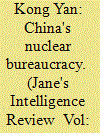

|
|
|
|
|
| Publication |
July 1993.
|
| Description |
320-326
|
|
|
|
|
|
|
|
|
|
|
|
|
|
|
|
| 5 |
ID:
144689
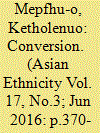

|
|
|
|
|
| Summary/Abstract |
This paper explores the role and impact of Christianity on the identity of the ‘self’ and the ‘other’ of the Naga converts. Christianity brings with it its own sets of cultures which are assimilated, appropriated or rejected by the converts. When an individual converts to Christianity, he/she assumes a new Christian identity whereof a new perception of ‘us’ and ‘them’ emerges. In the case of the Naga Hills, to be a ‘true’ convert, an individual was required to abandon the markers of his/her previous ‘heathen’ self. This was made into a requirement in order to receive baptism. This in turn involves a rejection of the previous lifestyle and the assumption of a new socio-cultural Christian identity. On the other hand, a non-convert looked upon conversion to Christianity not only as a threat to his/her self-identity but in some cases also to his/her Naga identity. This paper, therefore, seeks to understand the myriad impact of conversion on the individual convert, the reaction and responses of converts to their new Christian identity, their community at large and particularly to the non-converts.
|
|
|
|
|
|
|
|
|
|
|
|
|
|
|
|
| 6 |
ID:
011392
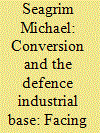

|
|
|
|
|
| Publication |
Feb 1997.
|
| Description |
21-28
|
|
|
|
|
|
|
|
|
|
|
|
|
|
|
|
| 7 |
ID:
084298
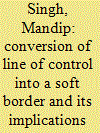

|
|
|
| 8 |
ID:
179849
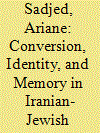

|
|
|
|
|
| Summary/Abstract |
The paper discusses the narratives of Jews from Mashhad, who were forced to convert to Islam in 1839. The community narrative as well as academic research is dominated by a modern understanding of religious identity and religious boundaries that fail to account for the diversity of practices among the community of converts, including multiple forms of religious belonging, and the switching of identities according to time and place. Based on historical sources and interviews with descendants from the Mashhadi community, the paper traces how a particular narrative of the history of the Jews from Mashhad prevailed and which significance this narrative entails for Mashhadi community and identity until today. While the Jews from Mashhad are a rather unique case among Iranian Jews–due to the long period in which they lived as converts–their pattern of memory building reflects a general trend among Jews from the Muslim world to assimilate to modern ideas of being Jewish.
|
|
|
|
|
|
|
|
|
|
|
|
|
|
|
|
| 9 |
ID:
159390
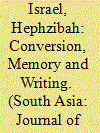

|
|
|
|
|
| Summary/Abstract |
Examining autobiographical statements left by South Asians converting to Christianity from the nineteenth century onwards, this article investigates the function of memory and literary narrative in three features common to several accounts: the translation of conversion accounts; the reconstruction of past events through narrative devices; and the re-formation of the Protestant individual conceived as part of a larger project of ‘reforming’ India as a state of progressive modernity. It argues that personal memory is inflected by conventions of writing about conversion, pressing into service specific tropes to exhibit the convert as ‘Protestant’. This economy of recall allowed converts to participate in wider public debates on religious and social reform by re-enacting conversion and confession in autobiography.
|
|
|
|
|
|
|
|
|
|
|
|
|
|
|
|
| 10 |
ID:
190976
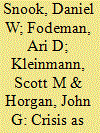

|
|
|
|
|
| Summary/Abstract |
In Western democracies, Muslim converts are overrepresented in Islamist terrorism compared to born-and-raised Muslims. Consequently, researchers have begun to consider how the process of conversion to Islam might influence participation in terrorism, yet empirical data are lacking. To explore these connections, the present study measured the conversion experiences of Muslim converts, as well as their intentions to engage in radicalism. One hundred and seventy-seven U.S. Muslim converts completed the Radicalism Intentions Scale, which measures willingness to engage in violent and illegal political behaviors to support one’s group, and the Adult Religious Conversion Experience Questionnaire, which measures the components of conversion, including crisis. Crisis is an experience of stress or difficulty that contributes to the collapse of one’s pre-conversion belief system (e.g., when an alcoholic hits “bottom”). Results indicate that the level of crisis that converts experienced was the only conversion variable associated with converts’ radicalism intentions, which suggests that crisis may be an important construct in connecting the processes of conversion to Islam and participation in Islamist terrorism.
|
|
|
|
|
|
|
|
|
|
|
|
|
|
|
|
| 11 |
ID:
159394
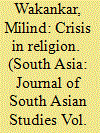

|
|
|
|
|
| Summary/Abstract |
The essay tries to understand how conversion to Christianity can transform language and its rhetorical possibilities inwardly. In the case of Jyotirao Phule, who was not a convert but was a critic of caste distinctions in nineteenth-century Western India, this meant that Marathi could now be used to uncover the link between Hindu apologetics and Brahmanism. Here I argue that the ‘humble’ Marathi used in missionary tracts made possible the emergence of the ‘I’ of the convert, and pushed ‘religion’ into the gap opened up in social life by a crisis of values, a crisis productively instrumentalised by Phule.
|
|
|
|
|
|
|
|
|
|
|
|
|
|
|
|
| 12 |
ID:
178425
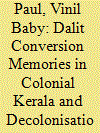

|
|
|
|
|
| Summary/Abstract |
This article seeks to decolonise knowledge of the conventional history of Dalits’ Christian conversion and its implications in colonial Kerala. As the missionary archive is the only source of Dalit Christian history writing in Kerala, in this historiography social historians have been unable to include the memories of Protestant missionary work at the local level by the local people themselves. Their experiences and rich accounts are marked by dramatic actions to gain socio-economic freedom and to establish a safe environment with the scope for future development. This article identifies how Dalit Christians themselves, in a specific locality, remember their conversion history, suggesting thereby the scope for a valuable addition to the archive.
|
|
|
|
|
|
|
|
|
|
|
|
|
|
|
|
| 13 |
ID:
016923
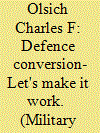

|
|
|
|
|
| Publication |
Feb 1994.
|
| Description |
50-51
|
|
|
|
|
|
|
|
|
|
|
|
|
|
|
|
| 14 |
ID:
015718
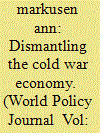

|
|
|
|
|
| Publication |
Summer 1992.
|
| Description |
389-399
|
|
|
|
|
|
|
|
|
|
|
|
|
|
|
|
| 15 |
ID:
163345
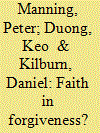

|
|
|
|
|
| Summary/Abstract |
This article explores stories of former members of the Khmer Rouge who have converted to Christianity. It sheds light on the intersections of patterns of religious change in Cambodia, which implicates peace-building, redress, and development trajectories in the wake of conflict and atrocities. The case raises important questions about why former members of the Khmer Rouge convert to Christianity and the social, political, and ethical implications of their conversions. We explore these questions to show that, while transitions and attendant redress efforts in Cambodia have been principally explained at the level of the state, we should pay closer attention to the granular experiences of former Khmer Rouge members as they navigate Cambodia’s changing post-conflict terrain, and the social and cultural sites through which they have made their experiences of the past meaningful.
|
|
|
|
|
|
|
|
|
|
|
|
|
|
|
|
| 16 |
ID:
015637
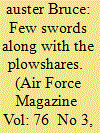

|
|
|
|
|
| Publication |
March 1993.
|
| Description |
63-66
|
|
|
|
|
|
|
|
|
|
|
|
|
|
|
|
| 17 |
ID:
008760
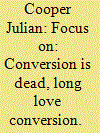

|
|
|
|
|
| Publication |
May 1995.
|
| Description |
129-132
|
|
|
|
|
|
|
|
|
|
|
|
|
|
|
|
| 18 |
ID:
008759
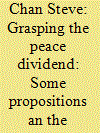

|
|
|
|
|
| Publication |
April 1995.
|
| Description |
53-95
|
|
|
|
|
|
|
|
|
|
|
|
|
|
|
|
| 19 |
ID:
080817
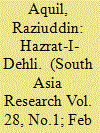

|
|
|
|
|
| Publication |
2008.
|
| Summary/Abstract |
This article explores the significant linkages between the rise of Delhi as the foremost Sufi centre and the bastion of Islam as well as the seat of political power in the 13th and 14th centuries. Three out of the first five leading Chishti saints of the Sultanate period chose to live in Delhi, catapulting the city onto the map of the sacred geography of South Asian Islam. The Chishti Sufis also helped in shaping the cosmopolitan character of the city, even as they ensured that the interests of Islam and Muslims were safeguarded. Hence, though Delhi remained the centre of Muslim power for close to six centuries and its landscape is dotted with mosques, madrasas and dargahs of the Sufis, the exclusionist, juridical interpretation of Islam was sidelined in favour of a more inclusive approach to religion practised and propagated by the Chishtis. The essay charts this process and its significance for the early history of Islam in India
|
|
|
|
|
|
|
|
|
|
|
|
|
|
|
|
| 20 |
ID:
173006
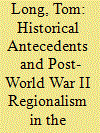

|
|
|
|
|
| Summary/Abstract |
After World War II, the US-led international security order exhibited substantial regional variation. Explaining this variation has been central to the debate over why is there no nato in Asia. But this debate overlooks the emergence of multilateral security arrangements between the United States and Latin American countries during the same critical juncture. These inter-American institutions are puzzling considering the three factors most commonly used to explain divergence between nato and Asia: burden-sharing, external threats, and collective identity. These conditions fail to explain contemporaneous emergence of inter-American security multilateralism. Although the postwar inter-American system has been characterized as the solidification of US dominance, at the time of its framing, Latin American leaders judged the inter-American system as their best bet for maintaining beneficial US involvement in the Western Hemisphere while reinforcing voice opportunities for weaker states and imposing institutional constraints on US unilateralism. Drawing on multinational archival research, the author advances a historical institutionalist account. Shared historical antecedents of regionalism shaped the range of choices for Latin American and US leaders regarding the desirability and nature of new regional institutions while facilitating institutional change through mechanisms of layering and conversion during this critical juncture.
|
|
|
|
|
|
|
|
|
|
|
|
|
|
|
|